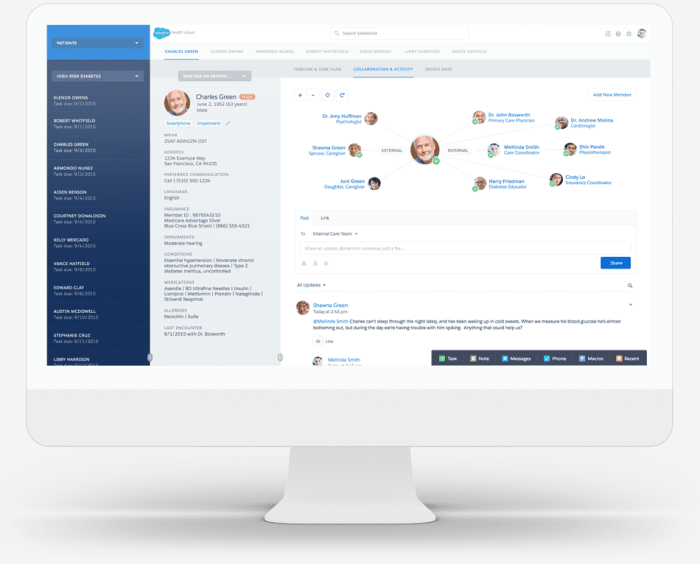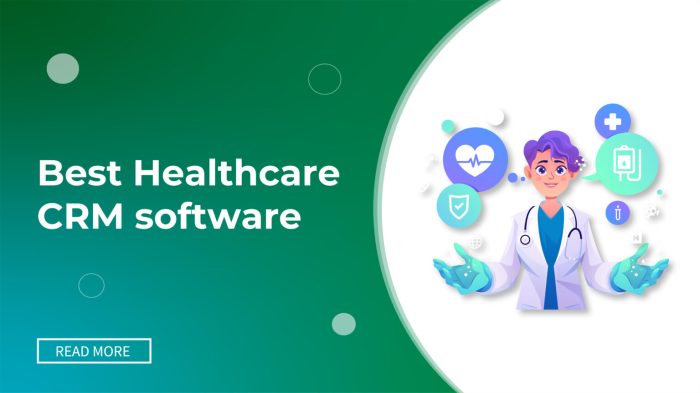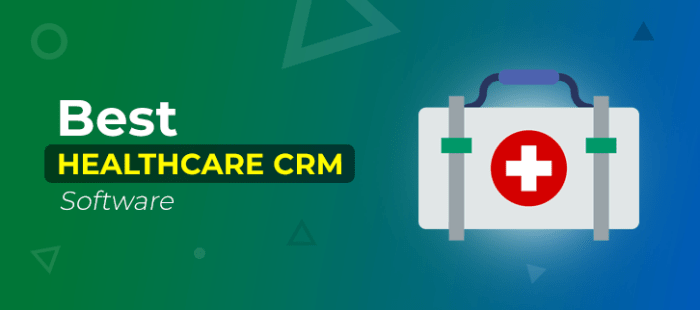Best healthcare crm software – The healthcare industry is increasingly reliant on technology to streamline operations, improve patient care, and enhance overall efficiency. A crucial element in this technological shift is the implementation of a robust Customer Relationship Management (CRM) system, specifically designed for the unique needs of healthcare providers. Choosing the right Healthcare CRM software can significantly impact your practice’s success, improving patient engagement, optimizing workflows, and boosting revenue.
This detailed guide explores the best healthcare CRM software options available, helping you make an informed decision for your organization.
Understanding the Need for Healthcare CRM Software
Unlike traditional CRM systems used in sales and marketing, healthcare CRM software requires specialized features to address the complexities of patient data management, HIPAA compliance, and the sensitive nature of medical information. Key features often include secure patient portals, appointment scheduling capabilities, electronic health record (EHR) integration, and robust reporting tools. A well-chosen system streamlines administrative tasks, improves communication, and fosters stronger patient relationships, ultimately leading to better patient outcomes and increased profitability.
Key Benefits of Implementing a Healthcare CRM
- Improved Patient Engagement: Personalized communication, appointment reminders, and secure messaging improve patient satisfaction and adherence to treatment plans.
- Streamlined Workflow: Automation of administrative tasks, such as appointment scheduling and billing, frees up staff time for direct patient care.
- Enhanced Communication: Centralized communication platform improves coordination among healthcare professionals and enhances communication with patients.
- Better Data Management: Secure storage and easy access to patient data ensures compliance with HIPAA regulations and improves decision-making.
- Increased Revenue: Improved efficiency, reduced administrative costs, and enhanced patient retention contribute to increased revenue.
- Improved Patient Retention: Proactive communication and personalized care fosters loyalty and reduces patient churn.
Top Healthcare CRM Software Options
The market offers a wide range of healthcare CRM software, each with its own strengths and weaknesses. The best choice depends on your specific needs, budget, and practice size. Here are some of the leading options:
1. Salesforce Health Cloud
Salesforce Health Cloud is a robust and scalable solution ideal for large healthcare organizations. It offers comprehensive features, including patient relationship management, care coordination tools, and integration with EHR systems. However, it can be expensive and may require significant technical expertise to implement and manage. Salesforce Health Cloud

Source: whatfix.com
2. Practice Fusion
Practice Fusion is a cloud-based EHR and practice management system that includes CRM functionalities. It’s a popular choice for smaller practices due to its affordability and user-friendly interface. While it offers basic CRM features, its capabilities may be limited compared to dedicated healthcare CRM solutions. Practice Fusion

Source: salestowncrm.com
3. Kareo
Kareo offers a comprehensive suite of practice management tools, including billing, scheduling, and patient communication features. Its CRM capabilities are integrated within the broader platform, providing a streamlined workflow for medical practices. It’s known for its strong billing and revenue cycle management features. Kareo
4. Athenahealth
Athenahealth is a leading provider of cloud-based medical practice management and electronic health record (EHR) systems. Its integrated CRM capabilities focus on improving patient engagement and care coordination. Known for its robust reporting and analytics tools. Athenahealth

Source: erpcrmprovider.com
5. drchrono, Best healthcare crm software
drchrono is a cloud-based EHR and practice management system with integrated CRM features. It’s designed for ease of use and offers mobile accessibility. It’s a popular choice for smaller practices looking for an all-in-one solution. drchrono
Choosing the Right Healthcare CRM Software: Key Considerations: Best Healthcare Crm Software
Selecting the right healthcare CRM requires careful consideration of several factors:
- Practice Size and Needs: A small practice may need a simpler, more affordable solution, while a large organization may require a more scalable and feature-rich system.
- Budget: Healthcare CRM software costs vary significantly, so it’s essential to set a budget before beginning your search.
- HIPAA Compliance: Ensure the software meets all HIPAA requirements for the secure storage and handling of patient data.
- Integration with EHR: Seamless integration with your existing EHR system is crucial to avoid data silos and improve workflow efficiency.
- User-Friendliness: The software should be intuitive and easy to use for all staff members.
- Reporting and Analytics: Robust reporting capabilities are essential for tracking key performance indicators (KPIs) and making data-driven decisions.
- Customer Support: Reliable customer support is crucial for resolving any technical issues or questions that may arise.
HIPAA Compliance and Data Security
HIPAA compliance is paramount when choosing healthcare CRM software. Ensure the software provider has robust security measures in place to protect patient data. Look for features such as data encryption, access controls, and audit trails. Compliance with HIPAA regulations is not just a legal requirement; it’s also essential for maintaining patient trust and protecting your practice’s reputation.
Frequently Asked Questions (FAQ)
- Q: What is the cost of healthcare CRM software? A: The cost varies greatly depending on the vendor, features, and number of users. Expect to pay anywhere from a few hundred dollars per month to several thousand dollars per month for enterprise-level solutions.
- Q: How long does it take to implement a healthcare CRM? A: Implementation time varies depending on the complexity of the system and the size of your practice. It can range from a few weeks to several months.
- Q: What are the key features of a good healthcare CRM? A: Key features include secure patient portals, appointment scheduling, EHR integration, communication tools, and robust reporting.
- Q: How can I ensure HIPAA compliance with my CRM? A: Choose a vendor that explicitly states HIPAA compliance and has robust security measures in place, including data encryption, access controls, and audit trails.
- Q: Can I integrate my healthcare CRM with my existing EHR? A: Many healthcare CRMs offer integration with popular EHR systems. Check the vendor’s specifications to ensure compatibility.
Conclusion
Selecting the right healthcare CRM software is a critical decision that can significantly impact your practice’s efficiency, patient care, and overall success. By carefully considering your specific needs, budget, and compliance requirements, you can choose a system that empowers your team, improves patient engagement, and drives positive outcomes. Don’t hesitate to explore free trials or demos before making a final decision.
Call to Action
Ready to transform your healthcare practice with a powerful CRM? Contact us today for a free consultation and let us help you find the perfect solution for your needs!
Answers to Common Questions
What is the average cost of healthcare CRM software?
Costs vary widely depending on features, scalability, and vendor. Expect a range from basic, affordable options to more comprehensive, enterprise-level solutions with higher price tags.
How do I integrate my existing EHR system with a CRM?
Many CRM systems offer seamless integration with popular EHR platforms through APIs or dedicated connectors. Check for compatibility before purchasing.
What security measures should I look for in a healthcare CRM?
Prioritize HIPAA compliance, data encryption, and robust access controls to ensure patient data privacy and security. Look for vendors with strong security certifications.
What are the key features to consider when choosing a healthcare CRM?
Essential features include patient relationship management, appointment scheduling, communication tools, reporting and analytics, and integration capabilities with other healthcare systems.
